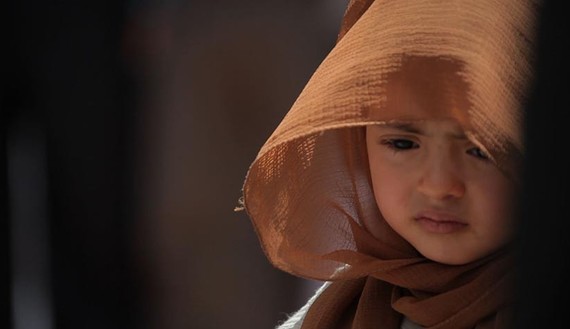If one only has 26 minutes to understand the tragedy of Yemen that has lasted for the past three years, one should watch “Karama Has No Walls.” Directed and produced by Yemeni-Scottish filmmaker Sara Ishaq, the film was recently nominated for an Academy Award for best documentary short film.
Ishaq’s film tells the story of March 18, 2011, when military forces, under former President Ali Abdullah Saleh, shot at civilian protesters, killing more than 40 peaceful protesters and injuring more than a hundred others. The day has become known as the Karama massacre, or “Day of Dignity” (karama means “dignity” in Arabic).
The film documents the events of that day in Yemen’s capital Sanaa that began just after Friday prayer.
A few days before, Saleh’s forces had built a wall at the entrance of one of the city’s squares — later dubbed Change Square — to prevent the increasing number of revolutionary youths from gathering in the square to protest. After Friday prayer, military snipers started shooting protesters from buildings behind the wall.
At one point in the film, protesters run toward the wall where the bullets are being fired, instead of running away from the bullets, jumping over the wall while under bullet fire. It was the Yemeni version of the Berlin Wall; Saleh’s regime collapsed with every stone that fell.
Before that day, Yemen had not had such terrifying experiences with death. It shook every area in the country and shocked the world.
In an email to a friend, Yemen’s most prominent activist Ibrahim Mothana — who passed away in September 2013 — described that day as follows: “When the shooting started, young people were running toward the snipers rather than running away. It’s hard to know if that moment of exceptional courage is a result of their undoubted [belief] in their destinies or simply because they lost faith in everything … ”
Ishaq’s is the first Yemeni film to make the Oscar nomination list. The final winners will be announced on March 2, a mere two weeks before Yemen’s third anniversary of the day the movie is all about.
Speaking to Al-Monitor via Skype, Ishaq, who just finished producing another film, “The Mulberry House,” said she and the team didn’t expect “Karama Has No Walls” to be nominated for an Oscar.
When the film first came out, she and her colleagues Abdulrhaman Hussein and Amin Al-Ghaberi joked with each other about three Yemenis (them) making it to the Oscars. It wasn’t that long after that Ishaq forwarded the Oscar news email she received to her friends, with the line saying, “Be careful what you wish for.”
The film’s Oscar nomination is the type of news that rarely comes out of Yemen, but it also comes at a stage when the country is experiencing deep political struggles between the factions of the regime in 2012 that were behind the attacks on civilians and those who defected from the government in the wake of Karama day to save themselves from any repercussions. After “Karama Friday,” Saleh was removed from power through an international deal, the Gulf Initiative, brokered by the Gulf Cooperation Council (GCC) and the United States, which provided him with immunity from any legal action and transferred his long-term vice president, Abed Rabbo Mansour Hadi, into an interim presidential seat.
To Ishaq, the film isn’t just about the humanitarian face of Yemen and its revolution, but also about the massive human rights violations committed by the regime during the revolution. Even today, not a single Yemeni official has been sent to court for the 2011 massacre. As the transitional president, Hadi issued a presidential decree in 2013 appointing a committee to investigate 2011 human rights violations. However, action didn’t move beyond the decree and the committee members are still not appointed today.
The different characters in the film present compelling stories about the level of injustice committed that day, that have still not received response. Saleem, who is in elementary school, is the son of a laborer who was in Change Square that day on March 18, when a bullet took out both his eyes.
The still unpassed transitional justice law presented by the Yemeni president to the parliament, which aims to bring justice to people like Saleem, was described as a shame by international organizations such as Human Rights Watch.
Three years after the Karama massacre, few Yemenis are happy with how things turned out in Yemen with the Gulf Initiative. Trading justice for security in Yemen resulted in actually losing both.
When Yemen makes it to world headlines, it is rarely for good news like an Oscar nomination. This time it is double the good news as Ishaq isn’t only the first Yemeni producer whose film makes it to the Oscars, but she is also the only woman on the list. Even more, it is with a film that explains very eloquently the Yemeni dreams that were in Yemen’s Change Square.








